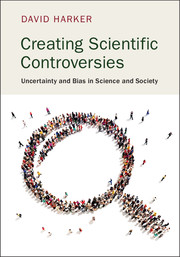Book contents
- Frontmatter
- Dedication
- Contents
- Preface
- Introduction: scientific authority and the created controversy
- Part I Lessons from the Philosophy of Science
- Part II Biases, Arguments and Created Controversies
- Part III Exposing Created Controversies
- 8 Environmental scare: the case of anthropogenic climate change
- 9 Sciences, religion and an intelligently designed controversy?
- 10 Issues of public health: AIDS, autism and GMOs
- Points to remember: Part III
- Concluding remarks
- References
- Index
8 - Environmental scare: the case of anthropogenic climate change
from Part III - Exposing Created Controversies
Published online by Cambridge University Press: 05 October 2015
- Frontmatter
- Dedication
- Contents
- Preface
- Introduction: scientific authority and the created controversy
- Part I Lessons from the Philosophy of Science
- Part II Biases, Arguments and Created Controversies
- Part III Exposing Created Controversies
- 8 Environmental scare: the case of anthropogenic climate change
- 9 Sciences, religion and an intelligently designed controversy?
- 10 Issues of public health: AIDS, autism and GMOs
- Points to remember: Part III
- Concluding remarks
- References
- Index
Summary
There are many who regard anthropogenic, global climate change as the most urgent problem facing humankind. There are also critics who dismiss the whole idea as a hoax, who remain deeply sceptical of even the basic scientific conclusions and who therefore feel no motivation to even consider policies that would reduce carbon emissions. Polls indicate that public attitudes are decidedly mixed. A 2010 study revealed that 61 per cent of Americans believed that the planet is getting warmer, but 45 per cent agreed that ‘[t]here is a lot of disagreement among scientists about whether or not global warming is happening’. With almost half the population supposing that there exists a genuine scientific controversy, it is worth exploring the accuracy of that judgement. Is the appearance of controversy a reflection of genuine scientific disagreement, or is this appearance better explained in terms of public ignorance of the relevant evidence, cognitive biases, poor argument evaluation and the agenda of groups that feel threatened by a scientific consensus? The chapter is not designed as an authoritative overview of the state of the science nor as an attempt to answer the many particular criticisms that have been levelled against the sciences surrounding climate change. We might nevertheless each hope to become better informed on the issue. Our framing concept of a created controversy will also prove instructive.
The first two sections of the chapter will survey the history of our understanding of the climate, then offer a greatly condensed argument for why scientists accept that human activity is responsible for recent unusual climate change. Providing even a brief overview will help us recognize that many of the objections raised against climate change are simply beside the point. For example, once we grasp even a shred of the science we'll realize that it is entirely irrelevant, for purposes of understanding anthropogenic climate change, that carbon dioxide is a natural gas, just as it's irrelevant that CO2 comprises only a tiny fraction of Earth's atmosphere. Unfortunately, despite their utter irrelevance, prominent individuals have offered both these observations as apparent challenges to climate science.
In the third section, we'll consider influences on public attitudes towards climate science, including what appear the most common given reasons for remaining agnostic.
- Type
- Chapter
- Information
- Creating Scientific ControversiesUncertainty and Bias in Science and Society, pp. 175 - 197Publisher: Cambridge University PressPrint publication year: 2015



